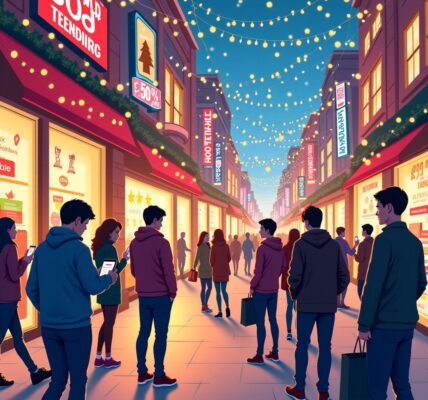The digital landscape is changing rapidly, and social media platforms are not just passive channels for user engagement anymore. They increasingly act as powerful marketing tools, promoting their own products through immersive campaigns. This shift represents a strategic move in a competitive marketplace where consumer attention is paramount.
Consider platforms like Facebook, Instagram, and TikTok. These social media giants have recognized that their strengths lie not only in connecting users but also in converting that connection into commerce. Advertising on these platforms has therefore evolved into a sophisticated, data-driven approach tailored to individual user behaviors. This article explores how these platforms are conducting immersive promotions and the implications for marketers.
Engaging Users Through Rich Content
One key strategy employed by social media platforms is the use of rich media content. Interactive posts, eye-catching videos, 3D AR experiences, and shoppable tags are now commonplace. According to a report by HubSpot, posts that incorporate multimedia elements get 94% more views than their text-only counterparts. For instance, Instagram’s shoppable posts allow brands to tag products directly, creating seamless pathways from discovery to purchase. In 2023 alone, brands reported a 40% increase in conversions through Instagram’s shopping features.
Leveraging User Data for Personalized Experiences
When it comes to immersively promoting products, data is king. Social media platforms have access to extensive user data, allowing them to tailor content to individual preferences. Algorithms analyze user behavior, interests, and purchase history to deliver personalized advertisements. McKinsey & Company found that businesses that utilize personalized marketing strategies experience a 20% boost in sales. These insights empower social media businesses to not only promote their products effectively but also to enhance user experiences by showing customers what they are more likely to buy.
Case Studies: Successful In-House Promotions
To illustrate the effectiveness of these strategies, let’s take a look at some notable examples.
Instagram’s Reels Ads: Instagram launched targeted ad campaigns within its Reels feature, aiming to capture the increasingly popular short video format. The platform collaborated with influencers to showcase products in authentic settings. This move resulted in a significant increase in engagement, with a 50% boost in brand mentions across the platform.
Facebook Marketplace: Facebook has successfully promoted its Marketplace feature, which allows users to buy and sell items locally. By integrating listings directly into users’ feeds and alongside their posts, Facebook keeps users engaged. In 2022, usage of Marketplace grew by 30%, highlighting the shift towards direct consumer transactions within social media.
The Impact on E-Commerce
These strategies have far-reaching implications for the e-commerce sector. With platforms promoting their own offerings as well as third-party products, traditional online retailers must rethink their strategies. The lines between social engagement and shopping are increasingly blurred. Retailers are now required to be proactive in creating engaging content that resonates with users. This calls for robust social media marketing strategies that align with the immersive experiences provided by the platforms.
The Role of Influencers
Influencers play a crucial role in this marketing evolution. Social platforms increasingly utilize influencers to promote their products, as these individuals bring authenticity to brand promotions. When influencers share content that integrates products seamlessly into their lifestyles, followers are more likely to trust the recommendations. For example, TikTok’s algorithm fosters influencer-led content that often goes viral, making it an effective platform for brand promotions. On TikTok, collaborations with creators have been shown to drive a 20% increase in product sales.
Challenges and Considerations
While immersive promotions present significant opportunities, challenges abound. As platforms double down on promotions, they face scrutiny regarding privacy and data security. Brands must navigate regulations such as GDPR, ensuring that data usage for targeting remains compliant. Furthermore, the pressure to create constant and engaging content may lead to burnout among marketing teams. It’s essential for brands to maintain a balance, focusing on quality rather than quantity in their promotional efforts.
Conclusion
In conclusion, social media platforms are transforming from simple communication tools to dynamic marketing ecosystems. Their ability to run immersive promotions presents both opportunities and challenges for businesses. Marketers must adapt by developing deep insights into user behavior, leveraging data for personalization, and collaborating with influencers to enhance authenticity. As this trend continues to grow, staying ahead of the curve will be crucial for brands looking to thrive in an increasingly interconnected marketplace.












